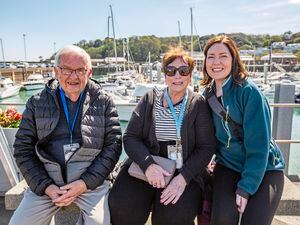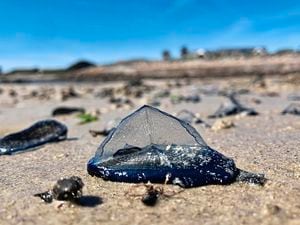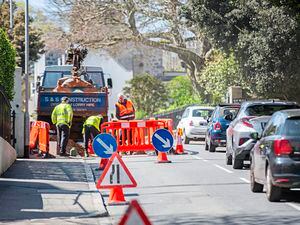Mediterranean moths invade as world warms up
THE effects of climate change are making themselves felt here.
THE effects of climate change are making themselves felt here. Evidence shows nature in Guernsey reacting in startling ways, with bumblebees remaining active year round and snowdrops flowering 20 days earlier than in 1985.
A small book to show the changing patterns in plants, animals and the weather locally will be released in the summer.
'We've been collecting information that several local people have collated over the last few years and it does show a very strong trend to an earlier spring each year,' said Commerce and Employment's agricultural adviser Andrew Casebow.
'For instance, some information shows that snowdrops over the past 20 years have got earlier by a day each year ' it's staggering.'
Spring flowers are generally getting earlier, with reports of some opening before Christmas, he added.
'At Raymond Falla House we've had a moth trap as part of the Rothamsted study over the past 30 years,' he said.
'Every morning someone collects moths caught in the trap and sends them off to Rothamsted. What we're seeing is a lot more Mediterranean species in Guernsey than ever before.
'Things that were a rarity a few years ago are now commonplace.'
He added that with rising sea temperatures, ormers were now moving as far north as Cornwall where they had never been found in the past.
La Societe Guernesiaise president Charles David said that insects in Guernsey were showing signs of population movements because of climate change.
'The common bumblebee has been out all through the winter and the workers are surviving, which I don't think they do in England and they didn't used to here,' he said. 'There are new insects arriving that have never been here before.'
These include the ant lion and tachinid fly, which are expected to reach the UK soon.
Mr Casebow and the UK Phenology Network's Tim Sparks are editing the booklet detailing the changes.
'We're hoping to bring it out in the middle of the summer which will give an indication of all these changes occurring in Guernsey, it's amazing what has been happening over the last 20 years,' said Mr Casebow.
'Grass is growing earlier. Last winter the cows were out grazing into November and December because it was a mild autumn and it continued to grow.'
The effects of climate change are hitting traditional producers.
Jersey's potato industry is suffering as others match their cropping date, while daffodils in the Isles of Scilly are beginning to flower too early for the market.
'These are all indicators of climate change and the work reminds us this is going on: summers are becoming drier and hotter, winters wetter and windier. That sort of pattern will continue,' he added.
'We can see that now, see it is really happening and witness it with our own eyes.'
The Springwatch survey, run by the BBC and Woodland Trust, has recorded over 60,000 wildlife sightings across the British Isles since January.
It is now into its second phase with the final results broadcast in May.
Already people have been recording the first sightings of bumblebees, frogspawn and seven-spot ladybirds.
Early reports from the survey indicate frogs and bumblebees have been the most affected.
*'For more information, go to www.bbc.co.uk/springwatch
www.phenology.org.uk
or www.woodland-trust.org.uk.





